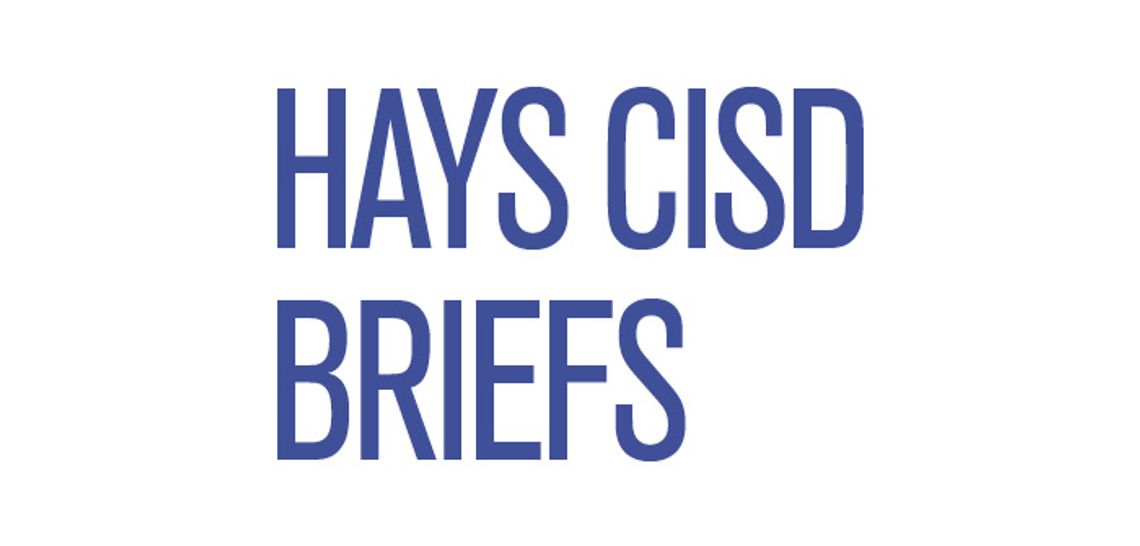For the first time in roughly a decade, Hays CISD leaders adopted a list of priorities they’d like to see state legislators tackle in 2019, but not without debate.
Eleven items comprised the district’s list, which was an initiative brought forth by Superintendent Eric Wright, who had accomplished a similar task with previous districts he worked with during state legislative years. Texas lawmakers began the 2019 legislative session in early January.
Multiple board members dissented on an item that would oppose the creation of property tax rate caps.
Seven of the 11 total items on the district’s wish list dealt with funding in some way. Modernizing Texas’ school finance formula to create additional funding was at the top.
The list included enhancements of funding weights, allotments and adjustments, as well as updates to the state’s Cost of Education Index (CEI) in order to cover the rate of inflation.
The district will also “support requiring the state to share the costs of funding public education by providing a minimum of 50 percent of the formula-funded revenue in order to reduce the burdensome costs to the taxpayers.”
According to “For a Better Texas,” the state’s current share of funding relative to the local share is projected to drop to 38 percent from the 42 percent level in 2017.
Additionally, the district supported the state funding universal full-day Pre-K.
However, multiple board members opposed Governor Greg Abbott’s request to cap property tax rates. Several trustees felt such a property tax cap could be detrimental for a fast growth district. The item was ultimately scrapped from the list due to lack of a consensus.
Hays CISD Trustee Will McManus said the item indicated to him that the district could increase property tax rates on a whim and burden taxpayers.
“While I understand why it’s stated the way it is, it does pose a question on how do we safeguard the taxpayer,” McManus said. “To me, that’s written as such that we’re going to go after the money we feel like we need.”
McManus said he understands voters make the ultimate decision on changing the tax rate, but wasn’t comfortable with the way the item was presented.
Wright argued that the state’s initiative to cap property tax revenue could hinder districts such as Hays CISD.
In 2018, Abbott proposed a bill that limits cities, counties and school districts from raising property taxes from the previous year more than 2.5 percent without voter approval.
After tense deliberation by Hays trustees on the issue, which included multiple drafts, the item was eventually dropped from the priorities list after consensus could not be reached.
“I hoped to not argue about it because if there are things that there are arguments about, or things there are concerned, I think it’s going to lessen the overall power of our document,” said Board President Merideth Keller. She added it was “very important” the board used common language and spoke in one voice.
But further dissention arose when trustee Michael Sanchez sought to add an item supporting a 20-to-1 student-to-teacher ratio from Kindergarten to the fourth grade. The item failed to be included on the list by a 2-5 vote, with Sanchez and Trustee Willie Tenorio casting their support.
Wright said he would love a 20-to-1 ratio, but said the state does not currently have the revenue stream to make it a reality.
The 20-to-1 ratio is an unfunded mandate, which means the school district would have to pay for the additional teachers to accommodate it. Sanchez argued the state should be required to pay for it, as the research indicates lower ratios are better for overall student performance.
But McManus said adding the item could clutter the priorities lists.
“I see this titled as legislative priorities, not everything we want the legislature to do,” McManus said. “I just want to make sure we are going after things we believe unanimously as a board are meaningful to both educating students everywhere in the state and specifically our district.”
McManus said he loves the idea of a 20-to-1 ratio, but called it a “pipedream”.
Sanchez cited that the last election cycle was proof of new members joining the Legislature who are committed to reforming public education. He argued that the first step is to ask. If the item is left out, the Legislature will not consider it.











